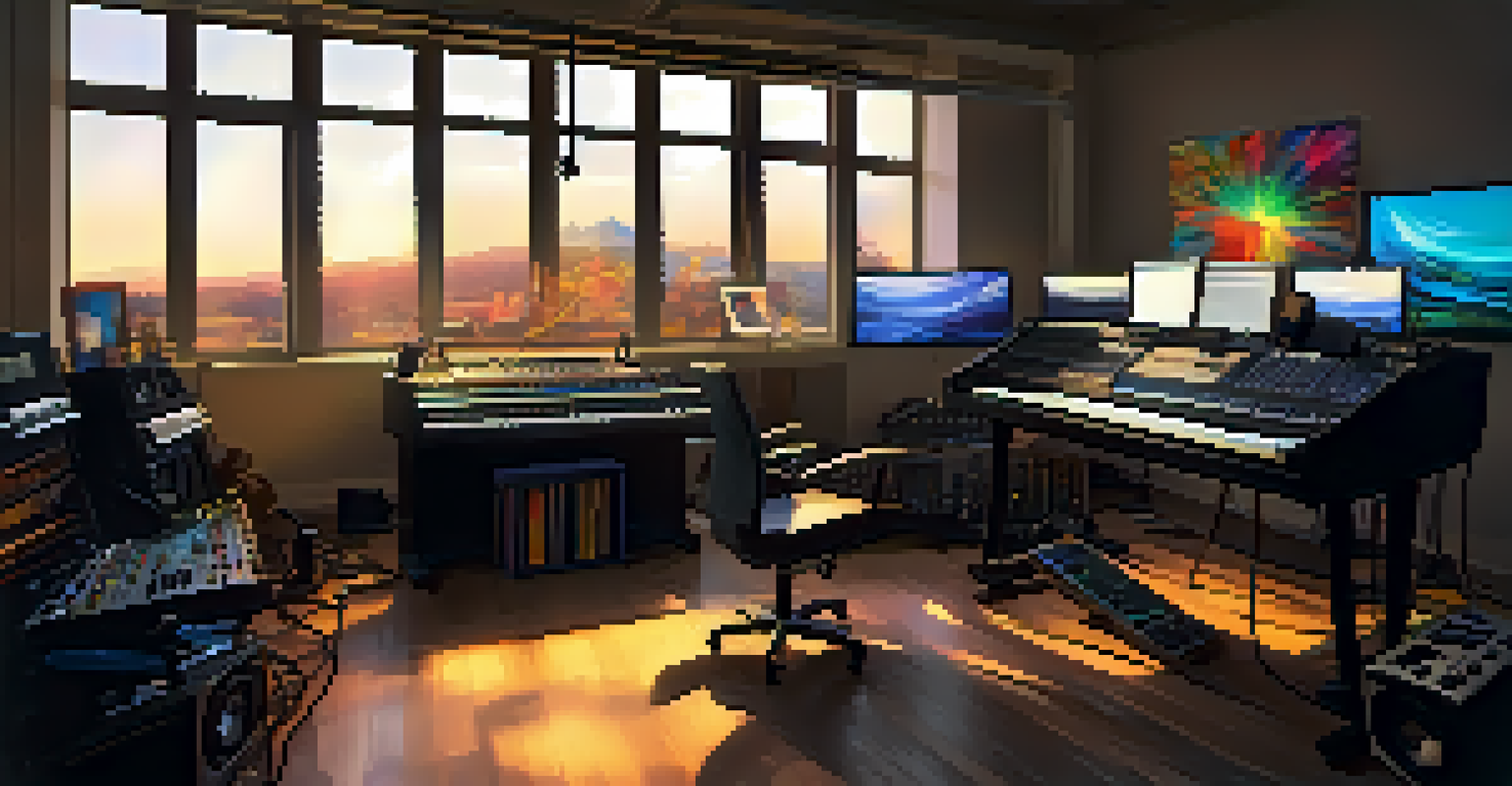Music Licensing Trends: Adapting to Changes in Digital Media

The Shift to Streaming: Music Licensing in the Digital Age
In recent years, streaming platforms like Spotify and Apple Music have changed the music landscape dramatically. As artists and labels embrace this shift, understanding music licensing becomes crucial. Licensing deals now often include provisions that cater specifically to streaming services, making it essential for creators to stay informed.
Music licensing is an essential part of the music industry, protecting the rights of creators while allowing them to monetize their work effectively.
The transition from physical sales to digital consumption means that licensing agreements must adapt to new revenue models. For instance, artists may receive royalties based on the number of streams rather than traditional album sales. This shift not only influences how music is distributed but also how artists monetize their work.
As streaming continues to dominate, it's vital for creators to navigate the evolving landscape of digital licenses. By understanding these changes, artists can better protect their rights and ensure they receive fair compensation for their work in this new era.
The Rise of User-Generated Content and Licensing Challenges
User-generated content (UGC) on platforms like TikTok and Instagram has exploded, presenting both opportunities and challenges for music licensing. Creators often use popular songs in their videos, which can inadvertently lead to copyright infringements if proper licenses aren't obtained. This trend emphasizes the need for clear licensing frameworks that accommodate social media usage.

For artists, UGC can be a double-edged sword. While it provides exposure and can drive streams, unauthorized use can also result in lost revenue and rights issues. Music licensing agreements need to clearly define how songs can be used in user-generated content to protect both the creator's rights and the platform's interests.
Streaming Changes Music Licensing
The shift to streaming platforms has transformed how artists earn royalties, requiring them to understand new licensing agreements.
As a result, many artists and rights organizations are advocating for more flexible licensing solutions that consider the unique nature of UGC. This shift could help ensure that creators are compensated fairly while allowing users to express their creativity.
Emerging Technologies: Blockchain and Music Licensing
The advent of blockchain technology is revolutionizing various industries, including music licensing. By creating a decentralized and transparent system for tracking music rights, blockchain can simplify the licensing process and ensure artists receive fair compensation. This technology has the potential to eliminate many of the inefficiencies that currently plague music rights management.
In the digital age, understanding music licensing is not just important; it's crucial for artists who want to protect their rights and earnings.
For example, smart contracts can automate payments to artists whenever their music is used, thus providing a faster and more reliable revenue stream. This not only benefits artists but also encourages more creators to share their work without fear of losing out on earnings. The promise of blockchain could lead to a more equitable music ecosystem.
As the music industry continues to explore blockchain solutions, it's crucial for artists and stakeholders to stay informed about these developments. Embracing technology can empower creators by giving them more control over their work and its distribution.
Navigating International Licensing: Global Implications
In our interconnected world, music licensing is not confined to national borders. As artists and labels distribute their music globally, understanding international licensing laws becomes essential. Each country often has its own regulations, which can complicate the licensing process for creators.
For instance, a song licensed in one country may not be automatically authorized for use in another, leading to potential legal challenges. This complexity highlights the importance of working with knowledgeable licensing professionals who can navigate the international landscape. Artists should prioritize understanding these differences to avoid costly mistakes.
Challenges with User-Generated Content
User-generated content presents both opportunities and licensing challenges, necessitating clear frameworks to protect creators' rights.
As global streaming continues to rise, the need for standardized international licensing practices is becoming more apparent. By advocating for clearer regulations, artists can ensure their rights are protected, regardless of where their music is played.
The Role of Music Supervisors in Licensing Decisions
Music supervisors play a pivotal role in the licensing process, especially in film, television, and advertising. They are responsible for selecting the perfect tracks to enhance visual storytelling, which can significantly impact an artist's exposure. Understanding how music supervisors work can help artists navigate this vital aspect of music licensing.
These professionals often seek out tracks that align with a project’s mood and message, making it important for artists to ensure their music is easily accessible for licensing. This could mean making their tracks available through licensing platforms or directly reaching out to music supervisors. Building these relationships can open doors for exposure in various media.
As the demand for quality music in media grows, the role of music supervisors becomes even more crucial. By understanding their needs and preferences, artists can better position themselves to be featured in sought-after projects, ultimately benefiting their licensing endeavors.
Adapting to Changes: Best Practices for Artists
As the music industry evolves, artists must adapt their approach to music licensing to thrive. Developing a solid understanding of licensing agreements and the rights associated with their work is essential. Familiarity with common terms and conditions can empower artists to negotiate better deals and protect their interests.
Additionally, artists should consider working with music licensing professionals or organizations that can provide guidance and support. These experts can help navigate the complexities of licensing agreements and ensure that artists are compensated fairly for their work. Building a strong team can make a significant difference in an artist's career.
Emerging Tech Reshapes Licensing
Blockchain and AI technologies are poised to revolutionize music licensing by enhancing transparency and automating compensation processes.
Ultimately, staying informed about industry trends and best practices will enable artists to leverage their music effectively. By proactively adapting to changes in the digital landscape, artists can secure their place in the ever-evolving music licensing world.
The Future of Music Licensing: Trends to Watch
Looking ahead, several key trends are likely to shape the future of music licensing. One significant trend is the ongoing push for transparency in royalties and licensing agreements, as artists demand fairer compensation. This movement is already gaining traction and is expected to continue influencing industry practices.
Another trend to keep an eye on is the rise of artificial intelligence in music creation and licensing. AI-generated music raises questions about authorship and rights, challenging traditional licensing practices. As technology continues to evolve, the music industry will need to adapt to ensure that all creators receive credit and compensation for their work.

Finally, the integration of augmented and virtual reality in music experiences opens up new avenues for licensing. As artists explore innovative ways to engage with their audience, understanding how to navigate these new platforms will be crucial. The future of music licensing is bright, but it will require adaptability and foresight from creators.